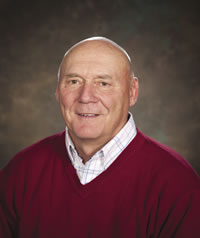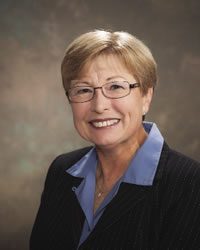The phrase "you have cancer" might be one of the scariest statements patients can hear from their physician.
Many questions follow including "how do I fight it," "what new treatments are available," and "what does this mean for my family?"
Patients and their families want to know they are receiving the best care possible and will search out opportunities for new and innovative treatments – because nothing less than their or their loved one's survival is at stake.
Why I give to
Marshfield Clinic

“I feel privileged to be able to contribute to Marshfield Clinic research to treat, cure or prevent childhood illnesses.”
- Bob Marsh, Rice Lake
Why I give to
Marshfield Clinic

“I have long realized the importance of research at Marshfield Clinic and therefore make a donation for research in memory of a friend or family member, which always seems to bring comfort and hope to a grieving family.”
– Barb Simonson, Marshfield.”
Marshfield Clinic has recently embarked on a new research initiative to create the cancer care delivery system of the future. It is organized around important components of oncology care – patient navigation, enrollment in clinical trials, and cancer care delivery research.
Patient navigation
Cancer care is becoming increasingly complex. Advances in the ways cancer is diagnosed, treated, and managed expand the patient's cancer care team. This team can include an array of specialists with different skill sets, including medical and radiation oncologists, specialized surgeons, radiologists, specialists in genetics, palliative care specialists, pharmacists, specialized nurses, research coordinators, support groups and others.
As treatment plans become more specialized to a specific patient, coordination of all these services becomes more and more critical. That's the role of oncology research nurse care coordinators.
"It's key to have this coordination being done by a single individual who follows and communicates with the patient, becomes familiar with this patient's care and develops a trusting relationship," said Matthias Weiss, M.D., an oncologist who is leading this new cancer patient care program for Marshfield Clinic.
Enrollment in clinical trials
Research through clinical trials is a growing component of innovative cancer care. Trials are the testing ground for new treatments, medications, and diagnostic techniques. They offer patients and their families hope by providing access to tomorrow's solutions today.
Marshfield Clinic, through its partnership with the National Cancer Institute's Community Clinical Oncology Program, is one of only three such programs in Wisconsin that provides access to hundreds of nationally recognized and cutting edge clinical trials for virtually every type of cancer.
"What distinguishes Marshfield Clinic is that our program is far more comprehensive," Dr. Weiss said. "Our enrollments in these trials are more than 20 times larger than any other regional health care facility. Only if you have an active research program like ours, can you have access to this many trials to evaluate promising new agents. These are typically available through clinical trials years before they become approved."
How care is delivered
Cancer Care Delivery Research (CCDR) is an emerging area of cancer research focusing on overall cancer care delivery. Rather than just focusing on organizational structure in hospitals and clinics, it includes research in social factors, technology, payment systems, and many other areas. In short, CCDR studies anything that might make an impact on how a patient receives cancer care.
A new type of nurse
To meet the needs of patients receiving this increasingly complex system of cancer care, Marshfield Clinic is adding oncology research care coordinators to the oncology team. Their primary duties will include:
-
Patient navigation: Working one-on-one with cancer patients and their families to coordinate their care plan and ensure appointments are made, medications are ordered and follow-up visits are scheduled in a timely manner.
-
Enrollment in national clinical trials: Screening for trial availability and eligibility, assisting with enrollment, assessing symptoms and reporting data.
-
Help with research projects: Monitoring, documenting and reporting key data generated from cancer care delivery research projects that will make a significant positive impact on how we deliver cancer care.
"Beyond all these duties, these specially trained nurses can provide highly personalized care," Dr. Weiss explained. "The care coordinator can help patients and their families deal with their emotions. Essentially, they make the process of dealing with the horrible diagnosis of cancer more manageable for the patient and the family."
System-wide initiative
Cancer doesn't discriminate based on location. To address the needs of cancer patients across the entire Marshfield Clinic system, a total of six oncology research care coordinators are being hired and stationed throughout the Marshfield Clinic system at cancer centers in Marshfield, Weston/Wausau, Stevens Point, Eau Claire, Rice Lake and Minocqua/Rhinelander.
Impact from philanthropy
Every year, hundreds of donors give generously to the Marshfield Clinic Research Institute cancer research fund. Because of the importance of this initiative, and the impact the research findings will have on the way cancer care is delivered in the future, the Foundation's leaders allocated more than $200,000 from this fund to hire the first three oncology research care coordinators.
This is just the start. Additional funds are needed to hire three more care coordinators.
For more information or to support cancer research, please contact Pete Schmeling, Development Officer – Research at
Schmeling.pete@marshfieldclinic.org or 715-389-3238.
